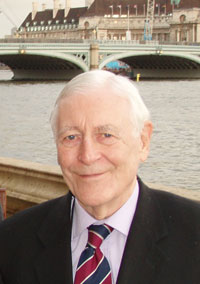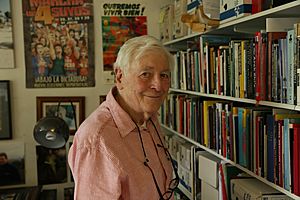Eric Lubbock, 4th Baron Avebury facts for kids
Quick facts for kids
The Lord Avebury
|
|
|---|---|

Lord Avebury in 2006
|
|
| Liberal Chief Whip | |
| In office 1963 – 18 June 1970 |
|
| Leader | Jo Grimond Jeremy Thorpe |
| Preceded by | Arthur Holt |
| Succeeded by | David Steel |
| Member of Parliament for Orpington |
|
| In office 15 March 1962 – 18 June 1970 |
|
| Preceded by | Donald Sumner |
| Succeeded by | Ivor Stanbrook |
| Member of the House of Lords | |
| Hereditary peerage 20 September 1971 – 11 November 1999 |
|
| Preceded by | The 3rd Baron Avebury |
| Succeeded by | Seat abolished |
| Hereditary peerage 11 November 1999 – 14 February 2016 |
|
| Election | 1999 |
| Preceded by | Seat established |
| Succeeded by | The 3rd Viscount Thurso |
| Personal details | |
| Born |
Eric Reginald Lubbock
29 September 1928 Orpington, Kent, England |
| Died | 14 February 2016 (aged 87) London, England |
| Political party | Liberal (before 1988) Liberal Democrat (after 1988) |
| Spouses |
|
| Children | 4, including Lyulph |
| Education | Upper Canada College Harrow School Balliol College, Oxford |
| Awards | Ahmadiyya Muslim Peace Prize (2009) |
Eric Reginald Lubbock, 4th Baron Avebury (born 29 September 1928 – died 14 February 2016) was an English politician. He was also a strong supporter of human rights. He served as a Member of Parliament (MP) for Orpington from 1962 to 1970. An MP is a person elected to represent a group of people in the national parliament.
After 1970, he became a member of the House of Lords. This happened when he inherited the title of Baron Avebury in 1971. The House of Lords is the second chamber of the UK Parliament. When most hereditary peers (people who inherit their titles) were removed from the House of Lords in 1999, he was chosen by his party to stay. He was the longest-serving Liberal Democrat peer when he passed away.
Contents
Early Life and Education
Eric Lubbock was born in Orpington, Kent, England. His father was Maurice Fox Pitt Lubbock. Eric was educated at Upper Canada College in Toronto, Canada. He also attended Harrow School in London, which is a famous private school for boys.
He then studied Engineering Science at Balliol College, Oxford. After his studies, he served as a Lieutenant in the Welsh Guards. In 1951, he joined Rolls-Royce, a well-known car and engine company. He worked there as a production manager and later as a production engineer.
Political Career and Achievements
Eric Lubbock joined the Liberal Party in 1960. The next year, he became a local councillor. In 1962, he ran for election in Orpington. He won the election with a large number of votes. This victory was seen as a big moment for the Liberal Party.
He kept his seat in Parliament in the 1964 and 1966 elections. In both elections, he ran against Norris McWhirter, who later co-founded Guinness World Records.
Leading the Liberal Party
As an MP for Orpington, Lubbock was made Chief Whip by Jo Grimond in 1963. The Chief Whip makes sure that members of their party vote in Parliament as the party wants. He held this important role until 1970.
When Jo Grimond stepped down as party leader in 1967, Eric Lubbock was one of three MPs who wanted to be the new leader. Jeremy Thorpe won the election.
Working for Fairer Votes
Eric Lubbock worked to make voting fairer. He was the only Liberal member on a special committee about how elections work. He tried to lower the voting age to 18. He also wanted to introduce a system called Single Transferable Vote (STV). This system helps smaller parties get a fairer share of seats in elections.
Helping Gypsy, Roma, and Traveller Communities
Lubbock also helped create the Caravan Sites Act 1968. This law aimed to make sure that local councils provided places for Gypsy, Roma and Traveller people to camp. The goal was to give them safe and legal places to stay.
Moving to the House of Lords
In 1970, Eric Lubbock lost his seat in Parliament. The next year, his cousin, the 3rd Baron Avebury, passed away without a male heir. Eric Lubbock then inherited the title and became the 4th Baron Avebury. This meant he became a member of the House of Lords.
In the House of Lords, he continued to work on important issues. He was a spokesperson for the Liberal Party on immigration and race relations. He also founded the All Party Parliamentary Humanist Group in 1976. This group works on human rights issues in Parliament.
In 1987, Lord Avebury made a humorous offer. He said he would leave his body to Battersea Dogs & Cats Home to protest the cost of cremation. The home politely declined his offer.
Championing Human Rights
Lord Avebury was a passionate supporter of human rights. He believed in the separation of church and state. He was a patron of British Humanist Association and an honorary associate of the National Secular Society. He even won the "Secularist of the Year" award in 2009. This was for his work in getting rid of old laws against blasphemy (speaking disrespectfully about religion).
He traveled to places like Eastern Turkey, Syria, and Iraq in the 1990s. He went there to investigate human rights problems faced by Kurdish people. Because of his reports, he was banned from entering Turkey for ten years. He was also banned from Kashmir and East Timor.
Lord Avebury was the President of the Peru Support Group. This group works to improve human rights in Peru. He also supported Prisoners Abroad, a charity that helps British citizens imprisoned in other countries. He was also involved in monitoring a peace agreement in Bangladesh.
He often spoke in Parliament about British nationality law. He strongly supported the rights of British ethnic minorities in Hong Kong to have full citizenship.
In 1964, he asked for a review of the Timothy Evans case. Timothy Evans was later given a pardon after his death.
In 2009, Lord Avebury received the first Ahmadiyya Muslim Peace Prize. This award recognized his lifelong work for human rights.
A writer named Damian Le Bas said that Lord Avebury was "one of the greatest friends the Travellers ever had." This was because of his 50-year commitment to helping the Gypsy, Roma, and Traveller communities in the UK.
Lord Avebury also supported activists in Bahrain. He continued to support them even when others did not. He often voted against his own party in the House of Lords. He opposed things like the "Bedroom Tax" and cuts to Legal Aid.
Supporting Engineering and Management
Lord Avebury was trained as an engineer. He kept a strong interest in science and engineering throughout his life. In 1957, he helped set up the Maurice Lubbock Memorial Fund. This fund supports engineering and management studies at Balliol College, Oxford. He led this fund for 56 years.
Environmental Protection
From 1972 to 1984, Lord Avebury was the President of The Conservation Society. During this time, he helped introduce the idea of 'sustainable development' into European law. Sustainable development means meeting our needs today without harming the ability of future generations to meet their own needs.
Personal Life
Lord Avebury was married twice. He had four children. He lived in Camberwell, London. He was an atheist and a humanist. He also practiced secular Buddhism.
He passed away in London on 14 February 2016, at the age of 87. He is buried near St. Giles Church in Farnborough, Kent.
|
 | Roy Wilkins |
 | John Lewis |
 | Linda Carol Brown |


